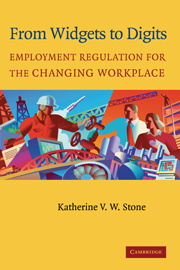Preface
Published online by Cambridge University Press: 14 January 2010
Summary
It is difficult to comprehend social change when living in the midst of it. It is easier to study periods of social change in the past – to describe the elements, evaluate the impact, search for linkages, and adumbrate the unintended consequences of change. Many historians have mined these rich veins to describe the changes that occurred in employment relationships as production shifted from an artisan-based system in the nineteenth century to the industrial system of the twentieth century. We are now undergoing another fundamental transformation of the workplace, and this book is an attempt to understand this current metamorphosis, to place it in historical context, and to explore its ramifications.
We are accustomed to thinking of history as divided into a series of parallel realms. Economic history, labor history, history of technology, intellectual history, political history, military history, and legal history are usually treated as separate enterprises, each with its own narratives of stability and change, its own moments of necessity and accident, and its own cast of insiders and outsiders. At times, one type of history imports another to enhance its own story, as when social historians weave in events from economic history to support their narratives or when intellectual historians use examples from legal history to strengthen their assertions of intellectual trends. But by and large, each type of history is studied as a separate story that happens to share with other types of history only a common moment in time. This book is based on a different understanding of how histories fit together and how they together bear on the present.
Information
- Type
- Chapter
- Information
- From Widgets to DigitsEmployment Regulation for the Changing Workplace, pp. vii - xiiPublisher: Cambridge University PressPrint publication year: 2004
